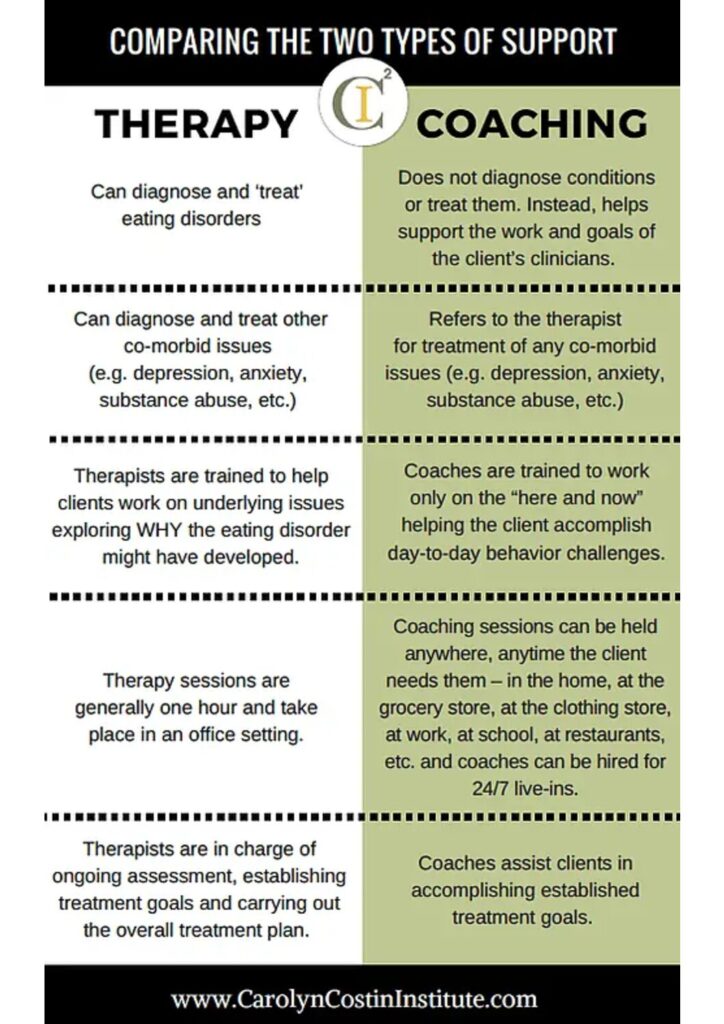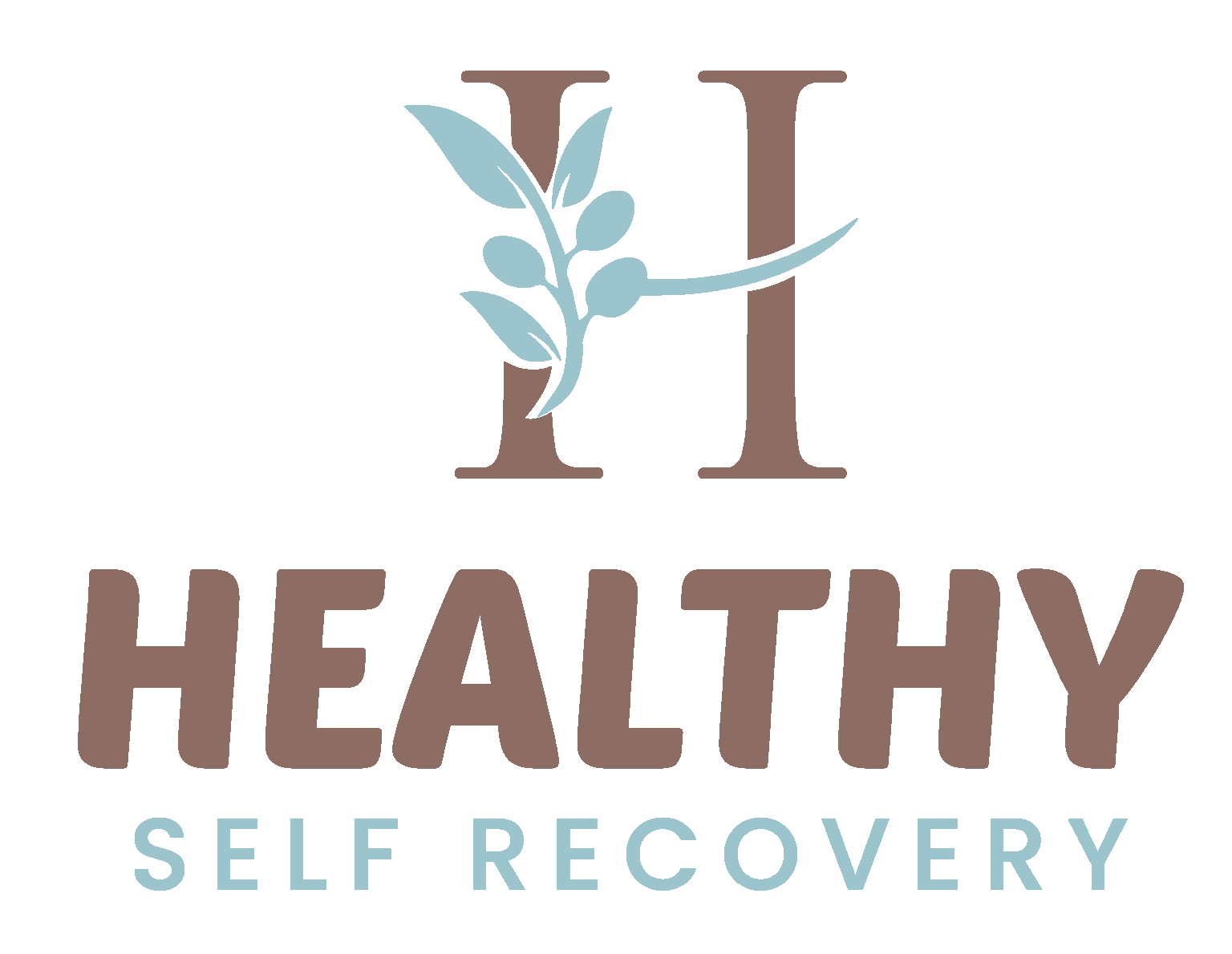If you want to find help and recover from your eating disorder you may have come across the options of therapy and eating disorder recovery coaching and be confused as to what the difference is and who you should work with.

What is The Difference Between Eating Disorder Recovery Coaching and Therapy?
Therapy For Eating Disorders
Therapists are highly trained licensed professionals who can diagnose and provide treatment plans. Therapy is primarily focused on the “WHY” of an eating disorder. It is a critical part of the recovery process/alongside behavioural interventions. Both are used to ensure nutritional rehabilitation because a malnourished brain will have difficulty focusing.
Therapy creates a safe space where individuals explore and understand childhood events, past traumas, relationships, and current concerns. The therapist’s role is to compassionately explore the link between emotions, events, and eating behaviours.
Therapy For Eating Disorder Goals
- Treating co-existing conditions such as depression, PTSD / social anxiety
- Learning to manage anxiety and distress without turning to food
- Learning to cope with the distress of eating
- Exploring the role of the eating disorder
- Finding alternative coping strategies, exploring relationships and life beyond an eating disorder
Common Therapeutic Approaches for Eating Disorders:
Certain therapeutic approaches are more effective with eating disorders than others. Depending on the eating disorder and individual the most common modalities are:
- Cognitive Behavioural Therapy (CBT) – targets the thoughts and patterns that contribute to adult eating disorders. It is most successful with anorexia sufferers but also effective with bulimia
- Enhanced Cognitive Behavioural Therapy (CBTE) – builds on CBT and addresses all types of eating disorders.
- Dialectical Behavioural Therapy (DBT) – focuses on regulating painful emotions and being mindful of thoughts and feelings. Shown to be successful with bulimia and binge eating
- Family Based Therapy (FBT) – also known as the Maudsley method, engages the entire family in normalizing eating behaviors for children and adolescents.
Traditional therapy normally takes place in an office setting (in person or online) for a 60-minute period. Therapists often collaborate with dietitians and clinicians to create a comprehensive recovery plan.
Eating Disorder Recovery Coaching
Coaching is a different form of therapy in that it focuses on the “How” and “Now” of an eating disorder. What this actually translates to is that coaches deal with all things food-related. The day-to-day behaviours, thoughts, and stresses that keep individuals entrenched in their eating disorders. Addressing their relationship with and food intake for many people is the hardest part of recovery. However, without dealing with food you cannot recover from an eating disorder.
The Focus of Eating Disorder Recovery Coaching
Eating disorder recovery coaching work centers around taking action. Facing, reframing thoughts, and changing behaviours. Coaches actively support individuals by equipping them with the skills and confidence to navigate challenging situations without relying on their eating disorder, helping them build a strong foundation for lasting recovery.
How Eating Disorder Recovery Coaches Can Provide Support
Eating disorder recovery coaches do this in multiple ways. The most important of all is by providing consistent daily support and accountability. Coaching is more flexible and can take place at any time and in a variety of settings. Because of this much of what a coach does is not feasible for other healthcare professionals due to time constraints or legal parameters.
- Meal Support – Coaches can offer meal support sitting and providing trained help with what is often the most difficult part of recovery.
- Shopping Support – Coaches can also offer shopping support.
- Messaging Support – The main differentiator is that coaches offer messaging support daily basis. Eating disorders are with people 24/7. So the ability for coaches to offer in the moment and after-hours support is a game changer.

Choosing a Qualified Eating Disorder Recovery Coach
Unfortunately in this day and age anybody can call themselves a coach. Therefore It is extremely important that if you decide to include coaching in your recovery journey you choose a fully trained and certified coach. Currently, the Carolyn Costin Institute (CCI) is the gold standard for eating disorder recovery coaching training. All CCI coaches are vetted before attending the year-long rigorous training. All coaches have to undergo a supervision period with clients where they are personally supervised by Carolyn herself.
Many CCI coaches have recovered from their own eating disorders. They are trained to use their own lived experience appropriately and only if it is in the best interest of the client. Being recovered means that not only do they act as a tangible role model for recovered living but also provide their clients with hope that full recovery is possible.
Therapy and Coaching: A Collaborative Approach
Eating disorders are highly complex illnesses with psychological, social, and biological roots. So the very best treatment approach is one that addresses all of these through working with a multidisciplinary team. Coaching is very much designed to be an ADJUNCT to therapy. Coaching is not a substitute for clinical treatment. It is not designed to be an either /or choice between therapy and coaching. Rather the two complement each other and together can make your recovery journey more successful and sustainable.
I hope that clarifies the difference between therapy and recovery coaching for eating disorders. If there is still any confusion then the below infographic from the Carolyn Costin Institute should help clarify. Reach out to Healthy Self-Recovery if coaching fits your needs.

Find Strength and Support with Eating Disorder Recovery Coaching
Finding the right support can make all the difference in your recovery journey. Eating disorder recovery coaching in the UK provides the daily guidance and accountability needed to break free from harmful patterns and build a healthier relationship with food. At Healthy Self Recovery, we’re here to help you take meaningful steps toward lasting healing. Follow these three simple steps to get started:
- Contact me to schedule a free discovery call to see if Eating Disorder Recovery Coaching is right for you.
- Begin meeting with me, Marianna Miles, an eating disorder recovery coach
- Start finding the strength and right support to heal!
Other Services Offered at Healthy Self-Recovery
As your eating disorder recovery coach, I’m here to walk alongside you at every step, providing guidance and encouragement as you work toward lasting healing. My eating disorder recovery coaching sessions are tailored to address the emotions, behaviors, and challenges connected to your eating disorder, with ongoing text support to help you stay motivated. I also offer compassionate meal support, creating a safe space to face food-related anxieties and develop healthier coping strategies. Collaborating with your medical team, I help ensure your recovery plan is aligned with your overall treatment goals for a well-rounded approach. Together, we’ll build a personalized path to healing, empowering you to reclaim your life beyond your eating disorder. My services are available throughout the UK, including England, Scotland, and Ireland, so you can access support no matter where you are.








